 Petzlover
Petzlover Jungle-Bob is originated from United States but Persian is originated from Iran. Both Jungle-Bob and Persian are having almost same weight. Both Jungle-Bob and Persian has almost same life span. Both Jungle-Bob and Persian has same litter size. Both Jungle-Bob and Persian requires Moderate Maintenance.
Jungle-Bob is originated from United States but Persian is originated from Iran. Both Jungle-Bob and Persian are having almost same weight. Both Jungle-Bob and Persian has almost same life span. Both Jungle-Bob and Persian has same litter size. Both Jungle-Bob and Persian requires Moderate Maintenance.
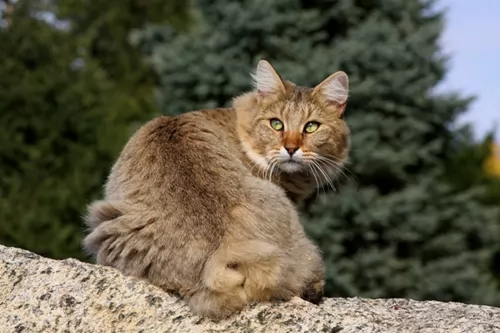 What is notable about this cat is that it can have a Bobcat like tail or it can have a full-length tail. They’re a fairly new breed and have been bred since the early 1990s. The whole purpose of breeding the cat was to develop a jungle cat hybrid with a spotted pattern.
What is notable about this cat is that it can have a Bobcat like tail or it can have a full-length tail. They’re a fairly new breed and have been bred since the early 1990s. The whole purpose of breeding the cat was to develop a jungle cat hybrid with a spotted pattern.
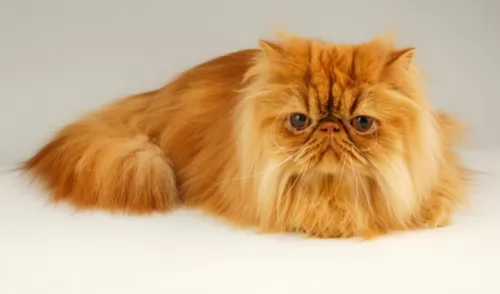 Cat lovers the world over know the Persian cat very well. It's a beautiful long-haired cat breed with its familiar round face and blunt muzzle.
Cat lovers the world over know the Persian cat very well. It's a beautiful long-haired cat breed with its familiar round face and blunt muzzle.
It is not really known when long-haired cats first appeared, or where the Persian originated but their history stems from Persia or Iran as it is known today, where it seems they were first sighted.
The cats were grey-coated and some were white and soon the cats arrived in Britain. They were introduced to the United States in the 1900s. The cat was developed first by the English, and then also by American breeders after the Second World War and the breeding of these cats has also meant a lot of coat colors.
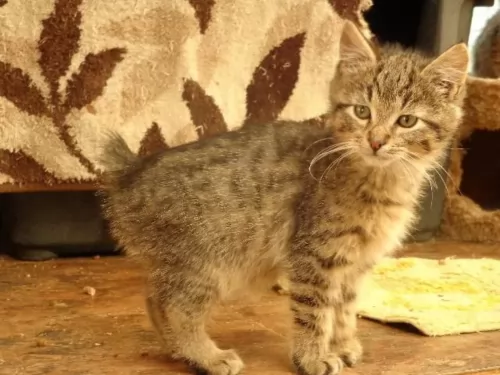 These are big cats and can weigh between 6 and 10kg. The leopard-spotted coat comes in all shades – brown, tawny, gold, silver and black with you not likely to see solid shades.
These are big cats and can weigh between 6 and 10kg. The leopard-spotted coat comes in all shades – brown, tawny, gold, silver and black with you not likely to see solid shades.
The coat can be short or medium-length. The cats have a thick muzzle and he has hooded eyes. The ears are fairly large and placed high o the head. They’re well muscled with long legs with the hind legs being fairly longer than the front legs
The Jungle-Bob loves his food. He loves interactive toys that hold the food and encourage him to think about how to get the food out.
He loves his human family and bonds strongly with them, loving to play rough and tumble games with the kids. He gets on well with children as well as other pets in the house.
You may find your Jungle-Bob being shy and not wanting to be friendly with strangers. They’re intelligent cats and have been known to learn how to open certain doors and cupboards. They can also be taught to walk on a leash.
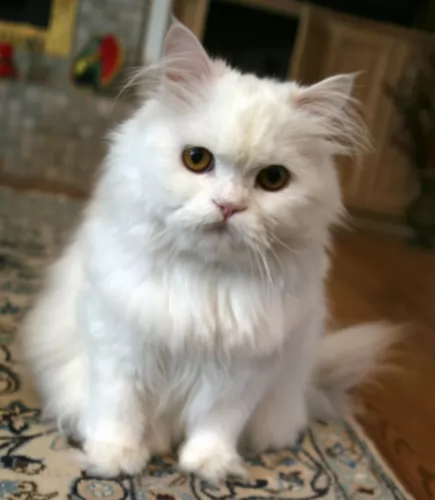 The Persian cat is a medium- to large-sized cat and is heavily boned. He can weigh between 3 and 6kg.
The Persian cat is a medium- to large-sized cat and is heavily boned. He can weigh between 3 and 6kg.
He has stocky legs, a thick neck, small ears, round head, round eyes, and the face is flat or blunt. The kittens are gorgeous balls of fluff.
The coat of the Persian is thick, long, and silky. People many times think only of a white Persian, when in fact the cat comes in many colors and patterns. Eye color for the cat can be blue, green, brown, copper or even odd-eyed.
The Persian isn’t the most active of cats, so attention will need to be given to exercising the cat so as to manage his weight. This cat will also need to have his nutrition controlled to stay in shape and in good health.
Persians enjoy games with their human family and will need some toys to encourage play and exercise.
He is placid and calm but that doesn’t mean he can’t have bursts of energy. They’re quieter than other cats, are sweet-natured, preferring to live in quieter, less boisterous households.
They aren’t loudly vocal but communicate with their eyes and their soft voices. They won’t get on well with small, noisy children but can be loving pets and companions of older children who allow them their own space.
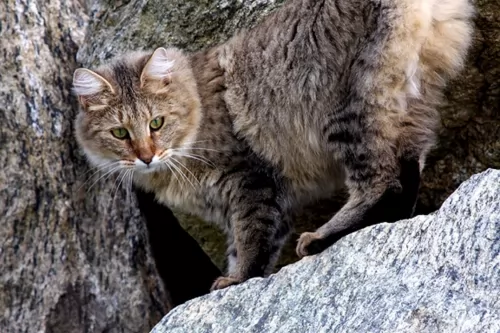 Your Jungle-Bob, just like all cats with a wild side, should have a largish outdoor cage. Keeping a hybrid cat like the Jungle-Bob is far more challenging than keeping a regular domesticated cat.
Your Jungle-Bob, just like all cats with a wild side, should have a largish outdoor cage. Keeping a hybrid cat like the Jungle-Bob is far more challenging than keeping a regular domesticated cat.
Hybrid cats like these are always active and they require lots of exercise. They can learn to walk on a leash.
Hybrid cats like this are made up of many species and they come with lots of interesting fur patterns. but that shouldn't be your motivation for buying one.
Think carefully before you own one of these cats as they’re beautiful for sure, but sometimes they become too much for the owners and then they land up in shelters. Be informed before you invest in one of these cats.
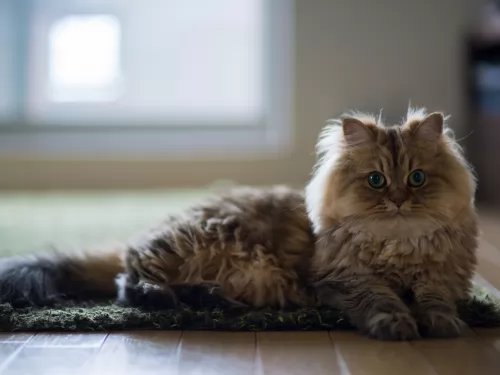 The amicable personality of the Persian cat makes it easy to have these cats in your home. The long hair becomes a bit of an issue as the cat sheds quite a bit.
The amicable personality of the Persian cat makes it easy to have these cats in your home. The long hair becomes a bit of an issue as the cat sheds quite a bit.
They’re sweet, quiet cats and they don’t demand attention from you. They are more than happy just lying quietly in a warm spot. They are calm, loving cats and it's no wonder that they are still such a popular breed of cat.
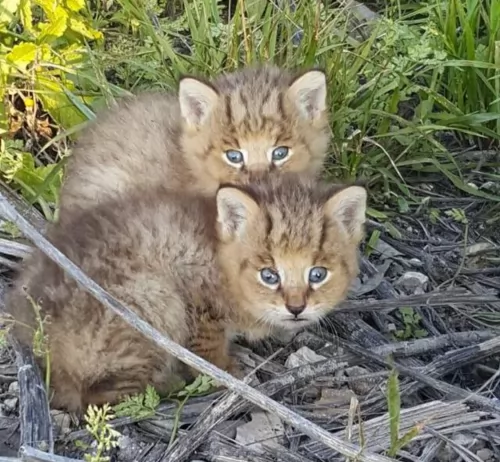 Even a trip to the vet can be a challenge and it can be a frightening experience for a hybrid cat. They may even need to be sedated before the vet can examine them.
Even a trip to the vet can be a challenge and it can be a frightening experience for a hybrid cat. They may even need to be sedated before the vet can examine them.
Also, did you know that in terms of rabies, which can be a fatal disease, it is not positive that these vaccines even work with a hybrid cat? So if your pet is exposed to rabies, it could spell great danger for you and your hybrid pet.
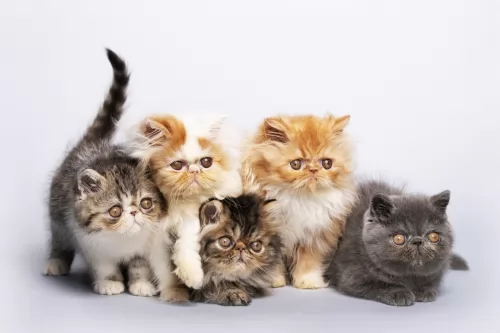 The structure of this cat’s head can mean some health problems. Hereditary Polycystic kidney disease is prevalent with the Persian cat. It is an inherited condition that causes cysts to form in the kidneys. These cysts are actually present from birth, growing larger over time and interfering with kidney function and ending in kidney failure.
The structure of this cat’s head can mean some health problems. Hereditary Polycystic kidney disease is prevalent with the Persian cat. It is an inherited condition that causes cysts to form in the kidneys. These cysts are actually present from birth, growing larger over time and interfering with kidney function and ending in kidney failure.
Also, with a larger breed cat such as the Persian, hip dysplasia is a problem.
Persians are also susceptible to malocclusion which means ‘incorrect bite’. This particular condition can affect the cat’s ability to grasp and actually hold food. So much so in fact, that now pet food manufacturing companies have even developed specially-shaped kibble to cater particularly for the Persian.
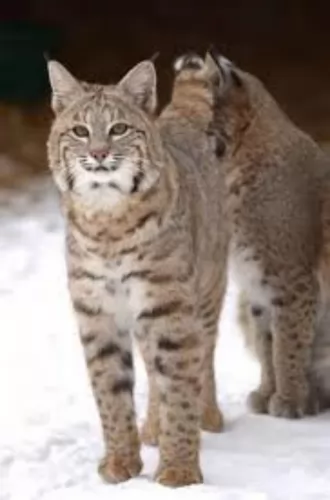 Before you invest in one of these hybrid exotic cats do research because they’re different from your regular domestic cats.
Before you invest in one of these hybrid exotic cats do research because they’re different from your regular domestic cats.
Because they have a wild side, they’re not suited to small apartments. Apart from being both an indoor and outdoor cat, he will require a fairly large outdoor cage with one part dedicated to shade and shelter for him.
Even though you will buy your Jungle Bob a litter box for indoors, remember that even though you train your cat to use it, the wild part of the cat means that he will spray and do his business on your carpets or against your furniture as well.
This is precisely why so many cat shelters are full of these cats. They become a handful for their owners, and their owners just hand them in as a bad experience.
A hybrid cat like the Jungle-Bob has a digestive system not quite the same as your regular domestic cat. It is absolutely imperative that these cats receive a meat diet as they are carnivores.
Keeping such a cat as a pet means you will need to invest in high-quality protein foods that sit well with this cat’s digestive system. A good guide for the Jungle Bob-cat is to steer clear of carbohydrates and feed your cat a protein-rich diet.
It is also a wise move to feed your new kitten the food that he has been eating at the breeder and then to make a gradual change to the best food protein there is.
Speak to your vet if in any kind of doubt. There are excellent high protein, high-quality commercial cat foods available on the market that make feeding a cat convenient as well.
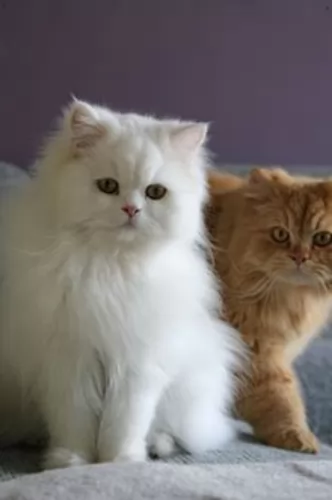 The Persian cat’s coat is long and silky and because he is a fairly heavy shedder, he will require regular brushing – certainly once or twice a week to get rid of that loose hair. It is important to brush and also cut the hair so as to get rid of the tangled knots that form.
The Persian cat’s coat is long and silky and because he is a fairly heavy shedder, he will require regular brushing – certainly once or twice a week to get rid of that loose hair. It is important to brush and also cut the hair so as to get rid of the tangled knots that form.
While brushing your Persian, make sure that his eyes and nose are clear. This is important because the flat face creates problems with these cats.
Excellent cat food for your Persian involves reading labels and understanding what brands are best for your beautiful cat. The Persian cat is a carnivore and will require high-quality food rich in protein.
Speak to your vet if you are in any doubt about the best food for your cat’s health and wellbeing. Make sure your pet has a constant supply of fresh, cool water.
Make sure to keep the litter box clean. Buy a small rake from the pet shop and rake up your cat's feces every single day and dispose of them.